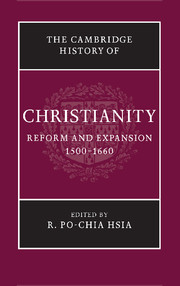Book contents
- Frontmatter
- Part I Luther and the Holy Roman Empire
- 1 Martin Luther, Reformer
- 2 Emergence and consolidation of Protestantism in the Holy Roman Empire to 1600
- 3 The Radical Reformation
- 4 Lutheranism in the Seventeenth Century
- Part II The Second Reformation
- Part III Catholic Renewal
- Part IV Resolving Confessional Conflicts
- Part V Religion, Society, and Culture
- Part VI Christianity and Other Faiths
- Bibliography
- Index
- References
1 - Martin Luther, Reformer
from Part I - Luther and the Holy Roman Empire
Published online by Cambridge University Press: 28 March 2008
- Frontmatter
- Part I Luther and the Holy Roman Empire
- 1 Martin Luther, Reformer
- 2 Emergence and consolidation of Protestantism in the Holy Roman Empire to 1600
- 3 The Radical Reformation
- 4 Lutheranism in the Seventeenth Century
- Part II The Second Reformation
- Part III Catholic Renewal
- Part IV Resolving Confessional Conflicts
- Part V Religion, Society, and Culture
- Part VI Christianity and Other Faiths
- Bibliography
- Index
- References
Summary
Luther and reform
The catalyst of the Protestant Reformation was the German Augustinian monk and university professor, Martin Luther (1483–1546). In the late medieval church, calls for renewal were loud and persistent and some reforms were enacted in monastic orders, in church life, and in popular movements associated with the names of John Wyclif (1384–1443) and John Hus (1369–1415). Compared with those strident voices, Martin Luther’s invitation to an academic debate on the power of indulgences in 1517 was a subdued summons. True, Luther had already been preaching against the indulgence practice and clerical negligence, but to call the young professor of biblical studies a church reformer prior to his circulation of the Ninety-five Theses would be an exaggeration. In the famous theses of 1517, the last thing on Luther’s mind was reform of the entire church.
Yet Luther has gone down in history as the first Protestant reformer because of the conflict with the Roman curia that was ignited by those theses. It was a quarrel that Luther did not seek but also one that he did not shun once it had begun. During the three years prior to his excommunication (1521), Luther forged the identity and self-awareness of a reformer and gained the collegial and political support that would make him a leader of the evangelical movement in Germany. Even then, however, Luther was not a reformer in the sense of implementing a preconceived plan to reshape the church. Once Luther and his followers were excommunicated, a process of restructuring Christianity in Europe did ensue, but neither Luther nor his colleagues were able to envision the outcome of that process.
- Type
- Chapter
- Information
- The Cambridge History of Christianity , pp. 1 - 19Publisher: Cambridge University PressPrint publication year: 2007

